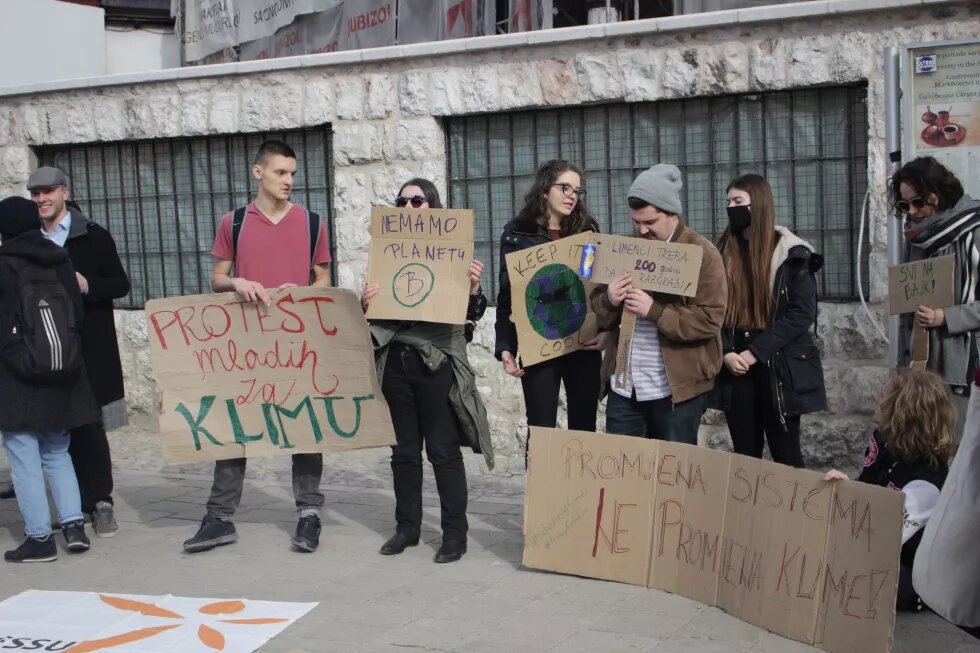March 15, 2019 marked a highlight for the “Fridays for future” movement. Over 200 parallel protests advocating for climate action were held worldwide. In Sarajevo, about twenty young people gathered in the Baščaršija to demand environmental protection from their government.

“Don’t burn our planet” “Sarajevo smrade moj” “Nemamo planetu B” - signs like these decorated the Baščaršija on Friday as people gathered to demand climate justice.
March 15, 2019 marked a highlight for the “Fridays for future” movement. Over 200 parallel protests advocating for climate action were held worldwide. In Sarajevo, about twenty young people gathered in the Baščaršija to demand environmental protection from their government.
“Fridays for future”, or “school strikes for climate”, is a global youth movement that aims to draw attention to the accumulating threat of climate change. Millions of young students are skipping school on Fridays to attend demonstrations demanding a reduction of carbon emissions, an abolishment of the use of fossil fuels and the development of a serious strategy to deal with global warming.
Two demonstrations were held in Sarajevo on Friday - one from the elementary school Silvije Strahimir Kranjčević, and one for the general public. “People in Sweden, Iceland and Portugal have some of the cleanest air in the Europe. So why are these topics more important to them than to the people in Bosnia and Herzegovina?” With this question, the nonformal activist group Slobodna zona called for participation. "We invite all students, parents, pensioners, teachers and interested citizens to join us and to care about the air you breathe and the water you drink".
The movement started when Greta Thunberg, a young Swedish girl, stopped attending school classes in protest in August 2018. Instead, she showed up at the entrance of the Swedish parliament, displaying a sign that said “Skolstrejk för klimatet” (school strike for the climate). Her solo strike gained international attention and since then inspired protests all over the world. “Greta should be a role model for all of us”, a student at the Baščaršija comments, “and I want to be more like her”.
Both on a European and on a global scale, climate change affects the poorest countries the hardest. Many sources list Bosnia and Herzegovina as the most polluted country in Europe, especially in cities like Lukavac, Živinice, Gračanica and Sarajevo. The coal powerplants and ash disposal sites pollute the air in Tuzla terribly, pushing locals out of their homes because their health is severely impacted. Meanwhile, the ash and dust clouds lingering over the city of Zenica exceeded EU safe limits on toxic gas 166 times in 2015 and make it hard to even take a breath. 44.000 people are killed from air pollution annually, and over 20% of the country’s GPD is spent on handling various consequences of climate change.
According to an opinion poll conducted by the regional cooperation council, 70% of the Bosnian population sees climate change as a serious problem, and over 50% place the responsibility to act on industrial & governmental entities. However, these sentiments are not adequately echoed in public. A study from the Konrad Adenauer foundation found that mainstream media barely picks up on the topic. Though experts and scientists in the country clearly express their concerns, the current government has yet to comment on their plans to fight global warming. So organised activism around climate change in the country remains scarce, even though it is more urgent than ever. “Environmental issues are not a priority here”, Slobodna zona comments. “People worry about other things. A large portion of the youth is unemployed, so talking about climate change is far from public discourse”.
Thus, March 15 was the first time that the demonstrations reached Bosnia and Herzegovina. The demonstration in the Baščaršija went peacefully and attracted many curious pedestrians, but also a few aggressions and slurs that the young activists responded to with impressing ease. “We are used to these kinds of people”, they comment later. “People get offended at everything… just look on the internet, everyone’s fighting. This happens at almost any demonstration”.
Still, the demonstration was a success both for Sarajevo and for the country. The participants were happy to have joined the protest: “This is more important than any fight about ethnicity or politics… this is more important than anything. Without nature, we cannot do anything”.
By Lena Gibbels, for hbs




